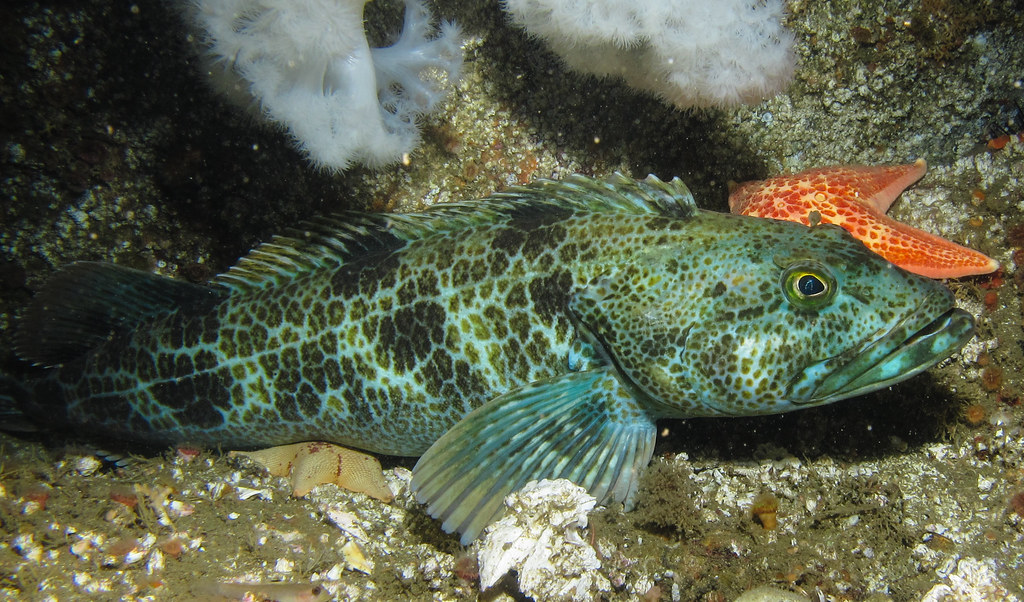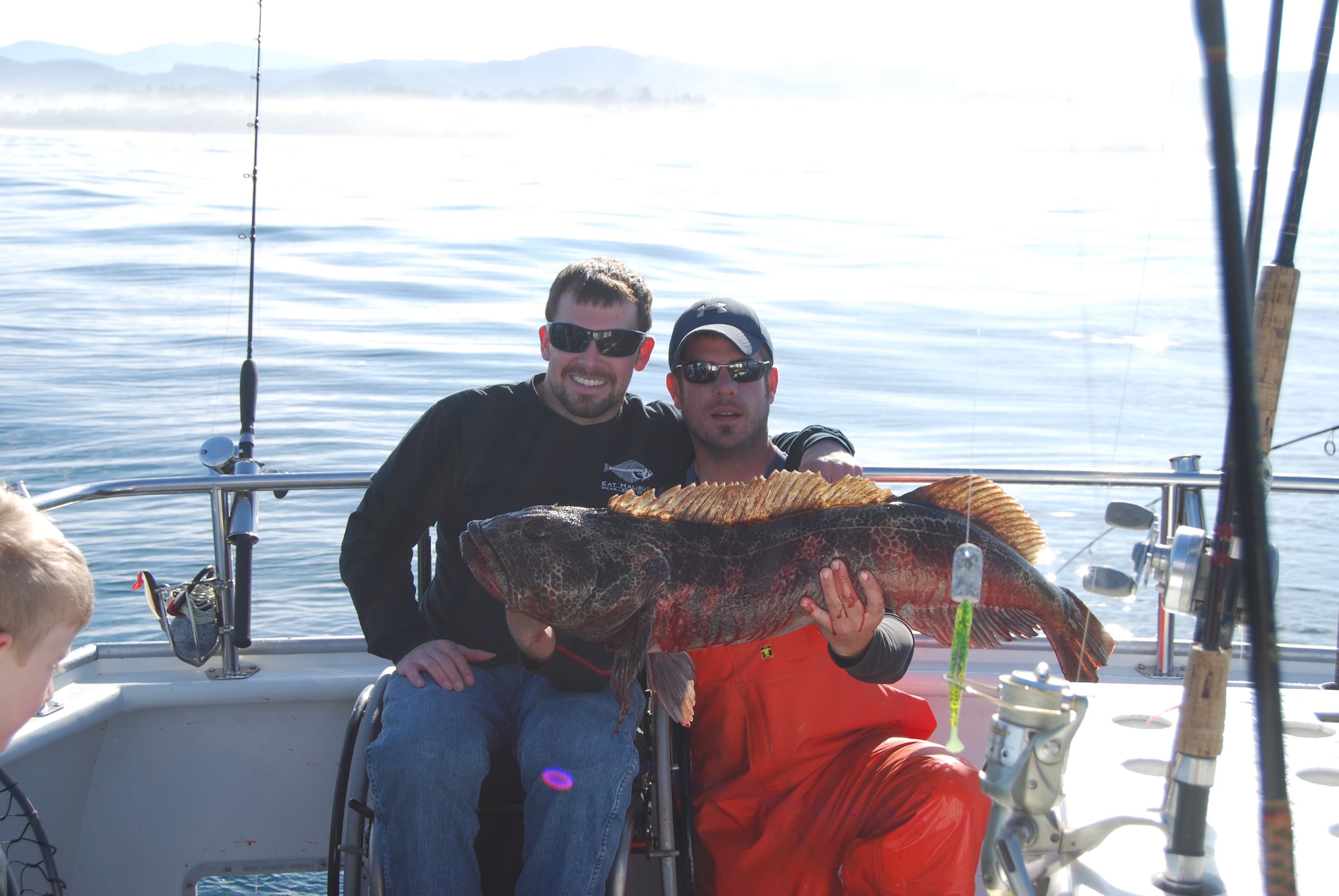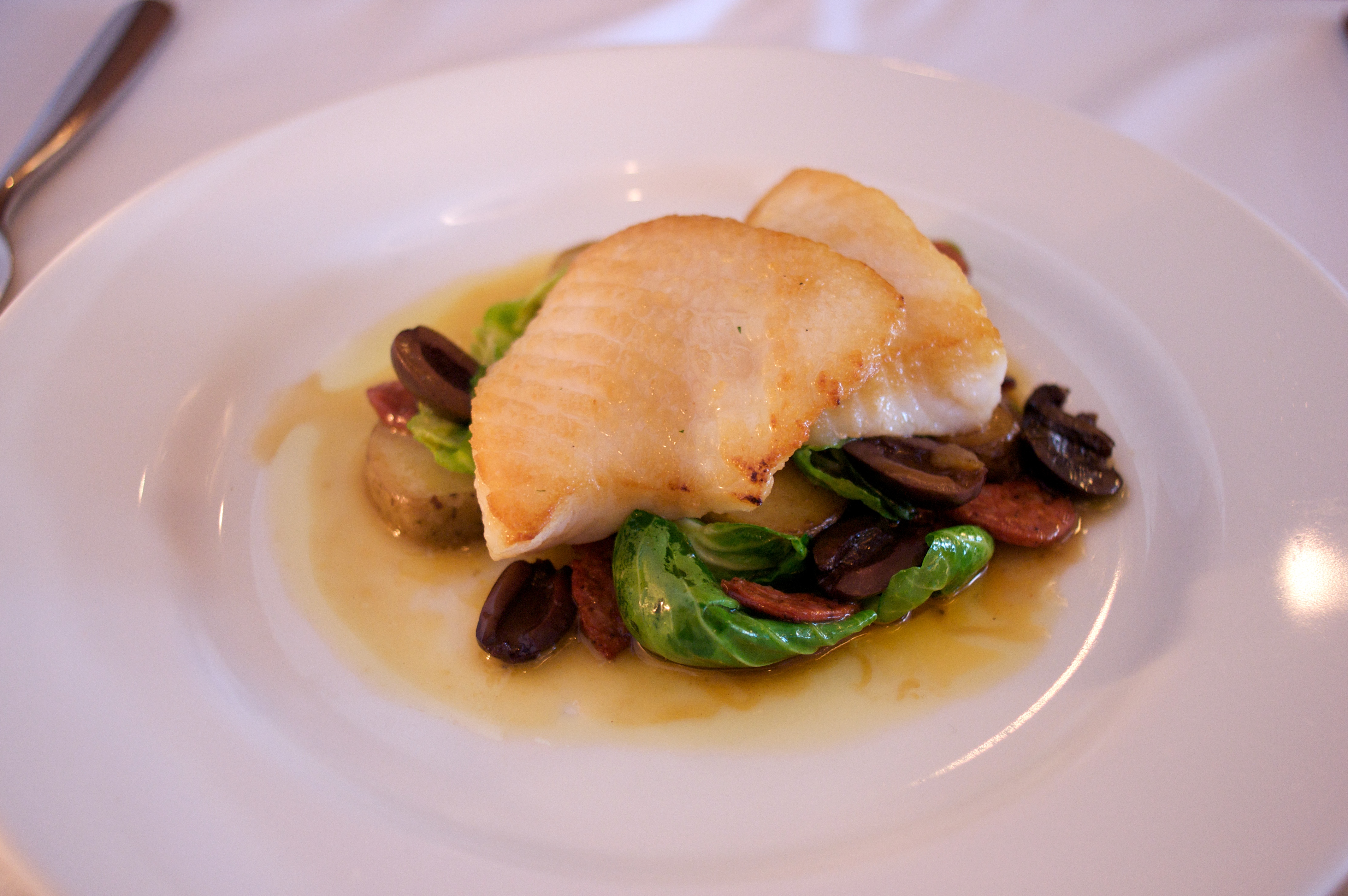Ophiodon elongatus
North Coast (Oregon Border to Point Arena)
North Central Coast (South of Point Arena to Half Moon Bay)
Central Coast (South of Half Moon Bay to Point Conception)
Santa Barbara (Point Conception to Point Dume)
South Coast (Point Dume to Mexico border)
Firm fish
Flakey fish
Wild caught
The Science

Taxonomic description
- Has an elongate body that can grow to be five feet and eighty pounds. [1]
- Grey, brown and greenish blotched coloring on its back helps them camouflage with the environment. [1, 3, 4]
- Underside is lighter in color. [6]
- Large head and mouth have gives it the nickname of “buckhead”. [1]
- Has eighteen large, sharp, canine-like teeth. [6]
Distribution
- With largest populations around British Columbia and Washington, ranges from the Gulf of Alaska down to Baja California. [1,4,5,6]
Life history
- Males generally live up to fourteen years, and females up to twenty years. [6]
- Sexual maturity is reached at about two years for males and three years for females. [1]
- Males become territorial in areas fit for spawning and though females are rarely observed in these areas, it is believed that they visit the area just long enough to deposit eggs throughout winter and spring. [1]
- After eggs are deposited (often in crevices), the males guard them from eight to ten weeks to protect them from numerous predators. [1]
Habitat
- As an adult, it lives along the rocky seafloor among seaweed, kelp, and eelgrass and preys on bottom dwelling fish, squid, crab, octopus, and smaller lingcod. [1]
- Larvae live closer to the top of the water column and feed on zooplankton. [1]
- In addition to cryptic coloration, lingcod will hide among rocks, in holes, and under overhangs in an attempt to avoid predatory threats such as sharks, marine mammals, and larger lingcod. [1]
- Being both a predator and prey, lingcod holds an important role as a secondary and tertiary consumer in the ecosystem. [7]
The Fishery

Seasonal availability
- Available year round. [1]
Managing authority
- Managed federally by the NOAA fisheries and, as established by the Magnuson-Stevens Act, the Pacific Fishery Management Council (PFMC) through the Pacific Coast Groundfish Fishery Management Plan (FMP). [1, 5]
- As established by the Marine Life Management Act, the California Fish and Game Commission (CFGC) regulates the fishery in state waters, and the California Department of Fish and Wildlife (CDFW) manages this fishery. [10]
- The California Groundfish Collective combines input from the industry and government entities to inform regulatory and management measures for this fishery. [11]
Gear type
- Fishing methods include gang trolls, bottom longline with hooks, rod and reel, hook and line troll, and bottom trawl. [1, 3, 4]
- Along the West Coast, lingcod is generally harvested in trawls with other groundfish. [1]
- Also frequently bycatch of bottom longline and salmon troll fisheries. [1]
Status of the fishery
- Based on stock assessments in 2017, Pacific Coast lingcod is not overfished. [1]
- From 2016 catch data, it has been determined that Pacific Coast lingcod is not subject to overfishing. [1]
- Gear innovations and better understanding of fishing behavior has helped avoid bycatch. [2]
- Similar regulations and management strategies are enforced in Alaskan waters by the State of Alaska through the Department of Alaska Fish and Game Commercial Regulations for Lingcod. [1,5]
Potential ecosystem impacts
- Trawls that come into contact with the ocean bottom effect the habitat, as they can tear apart the substrate and living components along the seafloor. Damage is decreased when lingcod over soft, sandy, or muddy floors is targeted. [1]
The Seafood

Edible portions
- Usually eaten with head and skin removed. [4,8]
Description of meat
- The raw flesh has a blue-green tint, but turns white when cooked. [1,2, 3,4]
- Meat is tender and firm, with large, soft, moist, mild-tasting flakes. [1,4]
Culinary uses 
- Available fresh and frozen as skinless and boneless fillets, H&G (headed and gutted), and steaks. [4, 8]
- View prep instructions for baked lingcod with lemon-garlic butter sauce--shown above. [9]
- Commonly baked, broiled, fried, grilled, sautéed, and steamed. [4, 8]
- For a recipe for baked lingcod with lemon-garlic butter, visit Simply Recipes. [12]
- For a smoked lingcod recipe, visit Bradley Smoker. [13]
Nutritional information
- Nutrition facts given for one 100 gram serving of raw Lingcod. [1]
- A good source of low-fat protein. [1]
- Has high levels of vitamin B12 and selenium. [1]
Toxicity report
-
Mercury levels in lingcod are considered to be elevated, so moderate consumption is recommended. [2]
Seasonal availability
- Available year-round. [1,8]
References
[1] NOAA. 2018. Lingcod. Web. https://www.fishwatch.gov/profiles/lingcod. Accessed: 1 March 2019.
[2] EDF Seafood Selector. 2018. Lingcod. Web. http://seafood.edf.org/lingcod. Accessed: 1 March 2019.
[3] ThisFish. Lingcod. Web. http://thisfish.info/fishery/species/lingcod/. Accessed: 1 March 2019.
[4] SeafoodSource. 2014. Lingcod. Web. https://www.seafoodsource.com/seafood-handbook/finfish/lingcod. Accessed: 1 March 2019
[5] NOAA Fisheries. Lingcod. Web. https://www.fisheries.noaa.gov/species/lingcod. Accessed: 1 March 2019
[6] Alaska Department of Fish and Game. Lingcod Species Profile. Web. https://www.adfg.alaska.gov/index.cfm?adfg=lingcod.main. Accessed: 1 March 2019
[7] Adam, C., Reilly, B., Shannon, K., Stuart, A. 2011. Ophiodon Elongatus. Web. https://animaldiversity.org/accounts/Ophiodon_elongatus/. Accessed: 1 March 2019
[8] FishChoice. 2018. Lingcod. Web. https://fishchoice.com/buying-guide/lingcod. Accessed: 1 March 2019
[9] Bauer, E. Baked Lingcod with Lemon-Garlic Butter Sauce. Web. https://www.simplyrecipes.com/recipes/baked_ling_cod_with_lemon_garlic_b.... Accessed: 1 March 2019.
[10] California Department of Fish and Wildlife. n.d. Marine Life Management Act. Web. https://wildlife.ca.gov/Conservation/Marine/MLMA. Accessed 2 December 2020.
[11] The Nature Conservancy. 2015. The California Groundfish Collective. Web. http://www.cagroundfish.org/#our-story. Accessed 2 December 2020.
[12] Bauer, E. Simply Recipes. n.d. Baked Ling Cod with Lemon Garlic Butter Sauce. Web. https://www.simplyrecipes.com/recipes/baked_ling_cod_with_lemon_garlic_b.... Accessed 15 January 2021.
[13] Bradley Smoker. 2021. Smoked Ling Cod Recipe. Web. https://www.bradleysmoker.com/recipe/smoked-ling-cod/. Accessed 15 January 2021.
[14] Kjaergaard, M. Wikipedia. 2006. Digital image. Web. https://commons.wikimedia.org/wiki/File:Lingcod1.JPG. Accessed 17 February 2021.
[15] Bierman, E. flickr. 2012. Lingcod. Digital image. Web. https://flickr.com/photos/edbierman/8151542586. Accessed 17 February 2021.
[16] dirtsailor2003. flickr. 2013. Lingcod 097. Digital image. Web. https://flickr.com/photos/dirtsailor2003/8609222670. Accessed 17 February 2021.
[17] Eng. R. flickr. 2009. Pan-seared BC Lingcod. Digital image. Web. https://flickr.com/photos/mac-ash/3550156597. Accessed 17 February 2021.
